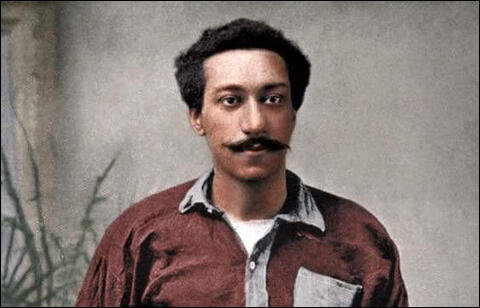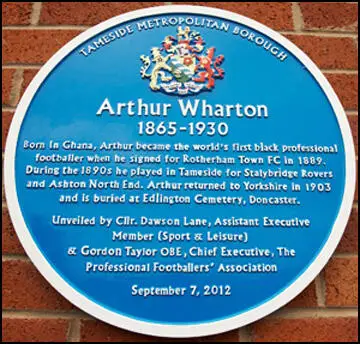Arthur Wharton
Arthur Wharton, the son of the Rev. Henry Wharton, a Wesleyan Methodist missionary from the West Indies, was born in Accra, Ghana on 28th October, 1865. Arthur was brought to England and was educated at Dr Cheyne's School in London between 1875 and 1879.
After spending time with his family in Grenada in the West Indies, Wharton returned to Britain in 1882 to train as a missionary teacher. He studied at Shoal Hill College before moving to Cleveland College in 1884.
Wharton was a very good athlete and began competing in sprint races in Darlington. Manny Harbon, a local coach, was impressed with Wharton and suggested he entered the Amateur Athletic Association (AAA) championships at Stamford Bridge. In July, 1886, he set a new world record when he ran the 100 yards in 10 seconds. He was the first black athlete to win an AAA championship.
This performance brought him to the attention of Preston North End and he joined the club later that year. Despite his tremendous speed he played in goal. In 1887 he played against West Bromwich Albion in the FA Cup semi-final but lost 3-1. Wharton played so well during this period that one football writer suggested he would win an international cap for England.

In 1889 Wharton signed for Rotherham United. As well as playing for the club he became licencee of the Albert Tavern in Rotherham. Later he ran the Plough Inn public house in the town. In September 1893 he married a local girl, Emma Lister. The couple had two daughters, Minnie and Nora.
In the late 1890s Wharton also coached Stalybridge Rovers. In 1896 he signed Herbert Chapman who was later to become a highly successful manager of Huddersfield Town and Arsenal.
After five years at Rotherham United he moved on to Sheffield United. When living in Sheffield he was employed to run the Sportsman Cottage public house in the city. Wharton had difficulty holding his place in the team and was eventually replaced by Bill Foulke. In 1895 he returned to Rotherham United where he played another 15 league games before joining Stockport County in 1901.
During this period he developed a drink problem and in 1902 he was forced to retire from football. Wharton found employment as a colliery haulage worker at the Yorkshire Main Colliery, Edlington. He joined the Miners Federation of Great Britain and took part in the 1926 General Strike.
Arthur Wharton died as a penniless alcoholic on 12th December 1930 at Springhill House Sanatorium in Doncaster. Two causes of death were recorded on his death certificate: epithelioma and syphilis.
The BBC News reported on 7th September, 2023. "A blue plaque will be unveiled in Rotherham to honour the man believed to be the first black professional footballer. Arthur Wharton signed full-time for Rotherham Town in 1889, six years after moving to England from Ghana. A plaque commemorating him is being installed later at the Clifton Lane ground where his team played. It will be unveiled by Ken Monkou, a former Chelsea and Southampton Premier League player."

Primary Sources
(1) Phil Vasill, Colouring Over the White Line: The History of Black Footballers in Britain (2000)
As a goalkeeper, one of his trademarks was his 'prodigious punch'. There were always two targets (yes, even when he was sober): the ball and the opponent's head, and he'd always connect with one. A number of match reports mention the run-ins he had with forwards. Goalkeepers could handle the ball anywhere in their own half and could be shoulder-charged with or without the ball. This physicality appealed to Arthur Wharton.
(2) Athletic Journal (29th October, 1887)
Good judges say that if Wharton keeps goal for Preston North End in their English Cup tie the odds will be considerably lengthened against them. I am of the same opinion ... Is the darkie's pate too thick for it to dawn upon him that between the posts is no place for a skylark? By some it's called coolness - bosh!'
(3) Philip Gibbons, Association Football in Victorian England (2001)
Trinidad-born Wharton had been the Amateur Athletic Association's hundred yards champion in both 1886 and 1887, as well as one of the first black professional footballers in England. However, his first team appearances were limited owing to the arrival of Willie Foulke from the Blackwell club in Derbyshire.
Foulke, who stood six feet and two inches tall, with a natural weight of thirteen stone, dominated the United goal area well into the following century, when his weight exceeded twenty stone. He played a leading part in United's success of the late 1890s as well as appearing in the English national side.
(4) T. H. Smith, letter to the Sheffield Telegraph and Independent (12th January, 1942)
In a match between Rotherham and Sheffield Wednesday at Olive Grove I saw Wharton jump, take hold of the cross bar, catch the ball between his legs, and cause three onrushing forwards - Billy Ingham, Clinks Mumford and Micky Bennett - to fall into the net. I have never seen a similar save since and I have been watching football for over fifty years.
(5) BBC News (7th September, 2023)
A blue plaque will be unveiled in Rotherham to honour the man believed to be the first black professional footballer.
Arthur Wharton signed full-time for Rotherham Town in 1889, six years after moving to England from Ghana.
A plaque commemorating him is being installed later at the Clifton Lane ground where his team played.
It will be unveiled by Ken Monkou, a former Chelsea and Southampton Premier League player.
Born in the Gold Coast, now known as Ghana, in 1865, to wealthy parents, Arthur Wharton moved to the north-east of England in 1883, aged 18, so he could receive an English education.
His footballing career started at Darlington FC, with spells at clubs including Preston North End, Sheffield United, Rotherham Town and Stockport County.
In 1886 he became the Amateur Athletics Association national 100 yards champion and a year later he set a record time for cycling between Preston and Blackburn.
Despite being a professional player, Arthur needed to supplement his income by running two Rotherham pubs, the Albert Tavern and the Plough Inn in Masbrough.
He retired from football in 1902 and died in 1930. He was buried in an unmarked grave in Edlington until the Arthur Wharton Foundation provided a headstone in 1997.
Representatives from the Football Unites, Racism Divides, the Arthur Wharton Foundation, the Mayor of Rotherham, councillor Robert Taylor and members of the football community, are expected to attend the ceremony.

